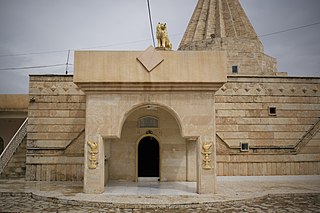
Sufism, also known as Tasawwuf, is a mystic body of religious practice found within Islam which is characterized by a focus on Islamic purification, spirituality, ritualism, asceticism, and esotericism. It has been variously defined as "Islamic mysticism", "the mystical expression of Islamic faith", "the inward dimension of Islam", "the phenomenon of mysticism within Islam", the "main manifestation and the most important and central crystallization" of mystical practice in Islam, and "the interiorization and intensification of Islamic faith and practice".

A tariqa is a school or order of Sufism, or specifically a concept for the mystical teaching and spiritual practices of such an order with the aim of seeking haqiqa, which translates as "ultimate truth".

Yazidism, alternatively Sharfadin, is a monotheistic ethnic religion that has roots in a western Iranic pre-Zoroastrian religion directly derived from the Indo-Iranian tradition. It is followed by the mainly Kurdish-speaking Yazidis and is based on belief in one God who created the world and entrusted it into the care of seven Holy Beings, known as Angels. Preeminent among these Angels is Tawûsî Melek, who is the leader of the Angels and who has authority over the world.
The qaṣīda is an ancient Arabic word and form of writing poetry, often translated as ode, passed to other cultures after the Arab Muslim expansion.

Haqiqa is one of "the four stages" in Sufism, shari’a, tariqa, haqiqa and marifa.
Teke or Tekke can refer to:

Sinjar is a town in the Sinjar District of the Nineveh Governorate in northern Iraq. It is located about five kilometers south of the Sinjar Mountains. Its population in 2013 was estimated at 88,023, and is predominantly Yazidi.
Yazdânism, or the Cult of Angels, is a pseudohistoric pre-Islamic religion with claimed ties relating to a Mithraic religion of the Kurds. The term was introduced and proposed by Kurdish and Belgian scholar Mehrdad Izady to represent what he considers the "original" religion of the Kurds.

Rābiʼa al-ʼAdawiyya al-Qaysiyya was an Arab Muslim saint, one of the earliest Sufi mystics and an influential religious figure. She is known in some parts of the world as Hazrat Rabia Basri, Rabia Al Basri or simply Rabia Basri. She is considered by many Muslims to be an example of piety and is a part of the complicated early history of Islam.

A ribāṭ is an Arabic term, initially designating a small fortification built along a frontier during the first years of the Muslim conquest of the Maghreb to house military volunteers, called murabitun, and shortly after they also appeared along the Byzantine frontier, where they attracted converts from Greater Khorasan, an area that would become known as al-ʻAwāṣim in the ninth century CE.

The Idrisiyya is a Sufi order which was founded by Ahmad Ibn Idris al-Fasi (1760–1837). It was originally called the Tariqa Muhammadiyya. This was not a Tariqa in the sense of an organized Sufi order, but rather a spiritual method, consisting of a set of teachings and litanies, aimed at nurturing the spiritual link between the disciple and Muhammad directly.

Yazidis, also spelled Yezidis, are a Kurdish-speaking endogamous religious group who are indigenous to Kurdistan, a geographical region in Western Asia that includes parts of Iraq, Syria, Turkey and Iran. The majority of Yazidis remaining in the Middle East today live in Iraq, primarily in the governorates of Nineveh and Duhok.

Yazidis in Germany may refer to people born in or residing in Germany of Yazidi origin, an ethnic group or Kurdish group who are strictly endogamous.

Yazidis in Syria refer to people born in or residing in Syria who adhere to Yazidism, a strictly endogamous religion. Yazidis speak the Kurdish language of Kurmanji. Although some are scattered in Turkey and the Armenia, Iraq is the center of their religious life, the home of their Amir, and of the tomb of their most revered saint, Sheikh Adi. Yazidis in Syria live primarily in two communities, one in the Al-Jazira area and the other in the Kurd-Dagh.

The Yazidi genocide was perpetrated by the Islamic State throughout Iraq and Syria between 2014 and 2017. It was characterized by massacres, genocidal rape, and forced conversions to Islam. The Yazidi people, who are non-Arabs, are indigenous to Kurdistan and adhere to Yazidism, which is an Iranian religion derived from the Indo-Iranian tradition. Over a period of three years, Islamic State militants trafficked thousands of Yazidi women and girls and killed thousands of Yazidi men; the United Nations reported that the Islamic State killed about 5,000 Yazidis and trafficked about 10,800 Yazidi women and girls in a "forced conversion campaign" throughout Iraq. By 2015, upwards of 71% of the global Yazidi population was displaced by the genocide, with most Yazidi refugees having fled to Iraq's Kurdistan Region and Syria's Rojava. The persecution of Yazidis, along with other religious minorities, took place after the Islamic State's Northern Iraq offensive of June 2014.

Pir Mam Rashan or Pir Mehmed Reshan was a 12th-century Yazidi saint. The Mam Rashan Shrine on Mount Sinjar was built in honor of him.
Sultan Êzîd is a divine figure in the Yazidi religion. Although many scholars consider his name to be derived from that of the second Umayyad caliph Yazid I, Yazidis consider him to be a separate figure unconnected to the historical Yazid I. Yazidis typically consider him to be part of a triad of divine emanations of God, though he is sometimes also considered to be identical with the angel Melek Tawus, and thus a manifestation or emanation of God.










